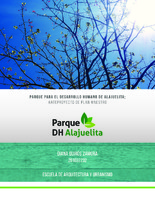Parque para el desarrollo humano de Alajuelita
Abstract
Alajuelita received a large amount of population due to the development of social housing projects in the 80s. This process was not complemented by recreational spaces or social equipment enough to respond to the new population, resulting in a déficit. San Felipe was the most affected district by the phenomenon.
Informal housing development has been increasing, exerting pressure on protected zones, occupying reserved áreas and the few residual sections used as parks between formal projects. To this is added índices of low cantonal competitiveness and human development.
The role of public space is important because it allows social interaction, construction of collective identity and promotes an atmosphere of respect for others. Its constructive character in society supports a positive relationship with nature. In marginal áreas, the segregation of the current city model and insecurity make them vulnerable to the lower clases. It is imperative, therefore, to counteract this social debt, in a way that protects the natural heritage and empowers communities for sustainable development through public spaces that allow to strengthen this population.
This Project is structured in chapters. It begins with the introductory aspects that explains the fundamentals necessary for its execution. Chapter 1 shows the social aspects of the context to which the proposal will respond. Chapter 2 specifies site analysis to respond consistently to the possibilities of the territory. Chapter 3 investigates the appropriate management model to support the project over time and chapter 4 sets out the urban-architectural guidelines under which the master plan will be developed.
Description
Proyecto de graduación (Licenciatura en Arquitectura y Urbanismo) Instituto Tecnológico de Costa Rica, 2017.


